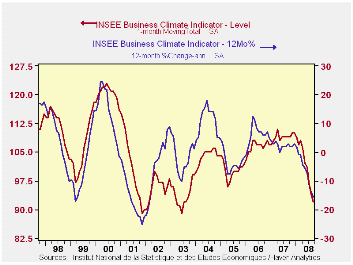 Global| Oct 09 2008
Global| Oct 09 2008INSEE Business Indicator is Dropping
Summary
The INSEE business climate indicator fell to 92 in September from 94 in August. It now stands in the 38th percentile of its range since 1990. The likely trends assessment by participants at a -41 reading is in the 16th percentile of [...]

The INSEE business climate indicator fell to 92 in September
from 94 in August. It now stands in the 38th percentile of its range
since 1990. The likely trends assessment by participants at a -41
reading is in the 16th percentile of its historic range of values.
Foreign and domestic orders are hovering near the 40th percentile of
their respective ranges. The likely sales price trend is still in the
80th percentile indicating that more upward movement is expected. By
count the headline is weaker than this only 22 percentile of the time
and the likely trend of output is weaker than this only 7% to 8% of the
time. This is a weak survey.
| INSEE Industry Survey | ||||||||||
|---|---|---|---|---|---|---|---|---|---|---|
| Since Jan 1990 | Since Jan 1990 | |||||||||
| Sep 08 |
Aug 08 |
Jul 08 |
Jun 08 |
%tile | Rank | Max | Min | Range | Mean | |
| Climate | 92 | 94 | 97 | 101 | 38.0 | 171 | 123 | 73 | 50 | 101 |
| Production | ||||||||||
| Recent Trend | -41 | -38 | -34 | -15 | 16.7 | 205 | 44 | -58 | 102 | -6 |
| Likely trend | -8 | -4 | -1 | 6 | 28.3 | 205 | 30 | -23 | 53 | 6 |
| Orders/Demand | ||||||||||
| Orders&Demand | -24 | -22 | -19 | -13 | 43.7 | 163 | 25 | -62 | 87 | -14 |
| FgnOrders&Demand | -25 | -20 | -14 | -6 | 37.1 | 175 | 31 | -58 | 89 | -10 |
| Prices | ||||||||||
| Likely Sales Price Trend | 15 | 17 | 19 | 15 | 80.9 | 19 | 24 | -23 | 47 | 1 |
Robert Brusca
AuthorMore in Author Profile »Robert A. Brusca is Chief Economist of Fact and Opinion Economics, a consulting firm he founded in Manhattan. He has been an economist on Wall Street for over 25 years. He has visited central banking and large institutional clients in over 30 countries in his career as an economist. Mr. Brusca was a Divisional Research Chief at the Federal Reserve Bank of NY (Chief of the International Financial markets Division), a Fed Watcher at Irving Trust and Chief Economist at Nikko Securities International. He is widely quoted and appears in various media. Mr. Brusca holds an MA and Ph.D. in economics from Michigan State University and a BA in Economics from the University of Michigan. His research pursues his strong interests in non aligned policy economics as well as international economics. FAO Economics’ research targets investors to assist them in making better investment decisions in stocks, bonds and in a variety of international assets. The company does not manage money and has no conflicts in giving economic advice.
More Economy in Brief
 Global| Feb 05 2026
Global| Feb 05 2026Charts of the Week: Balanced Policy, Resilient Data and AI Narratives
by:Andrew Cates






